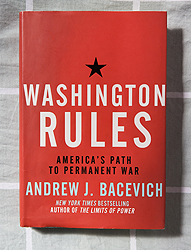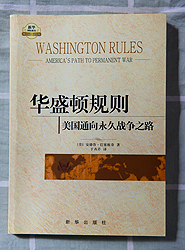|
 |
|
(WANG YOUFEN) |
 |
|
(WANG YOUFEN) |
Facing off against U.S. political and military players may not bode well for one's future, but criticizing and writing about powerful forces sometimes does. Andrew J. Bacevich, a professor of international relations and history at Boston University, has published several books critical of U.S. foreign and defense policies that have captivated readers around the world in recent years. For his latest book, Washington Rules: America's Path to Permanent War, CNN hailed Bacevich as a leading voice among anti-war critics. A Chinese language version of the book was released earlier this year.
As the book points out, U.S. national security policy since the 1950s boils down to what Bacevich calls the Washington rules, a consensus in Washington consisting of two components: the American credo and the sacred trinity. The American credo, Bacevich says, "summons the United States—and the United States alone—to lead, save, liberate, and ultimately transform the world." To ensure world peace and order, the sacred trinity "requires the United States to maintain a global military presence, to configure its armed forces for global power projection, and to counter existing or anticipated threats by relying on a policy of global interventionism." The two are mutually supplementary, one defining purpose and the other defining practice.
Origins
In analyzing the evolution of the Washington rules, Bacevich writes, "Prior to World War II, Americans by and large viewed military power and institutions with skepticism... In the wake of World War II, that changed. An affinity for military might emerge as central to the American identity."
Bacevich singles out publishing magnate Henry R. Luce for initiating this change and introducing the concept of an American century. Writing in Life magazine in 1941, Luce exhorted his countrymen to "accept wholeheartedly our duty to exert upon the world the full impact of our influence for such purposes as we see fit and by such means as we see fit." His manifesto has exerted a profound influence—and more importantly, his conception of an America Age found strong support in Washington.
Among the creators of the sacred trinity, two men stand out—Allen Dulles, Director of the CIA from 1953 to 1961; and Curtis LeMay, the four-star general in charge of the U.S. Strategic Air Command (SAC) from 1948 to 1957. The CIA and SAC wielded power beyond their mandates. Besides conducting espionage, the CIA stationed operatives worldwide engaged in disseminating misinformation, bribery, sabotage and assassinations to influence politics in other countries. LeMay transformed the SAC into a global nuclear strike force capable of destroying not only the Soviet Union, but the entire Communist world many times over.
Every U.S. president since Harry Truman in 1945, Republicans and Democrats alike, has flaunted the policy differences they've shared with their domestic political rivals or predecessors, but none has attempted to depart from the Washington rules. Bacevich writes, "to cast doubts on the principles of global presence, power projection, and interventionism, as Republican Congressman Ron Paul (who advocates limited government and opposes intervention abroad) and Democratic Congressman Dennis Kucinich (who opposes using force as a tool for foreign policy) did during the 2008 presidential primaries, is to mark oneself as an oddball or eccentric...certainly not someone suitable for holding national office." Both Paul and Kucinich are among the few U.S. politicians against U.S. armed intervention in Libya.
Unchallenged and outdated
With the exception of the Viet Nam War, the Washington rules have been met with little resistance at the grass-roots level. Only 15 years after that war, which shook the rules to their foundation, the American credo and sacred trinity were fully restored. This was achieved, Bacevich says, by identifying a scapegoat, with liberals, academics and "biased media" bearing much of the blame. Then a plan was hatched to look for suitable persons to reverse the war's apparent verdict. The result was the publication of The Viet Nam Legacy: The War, American Society, and the Future of American Foreign Policy. This book was conceived under the auspices of the Council on Foreign Relations, a highly influential research institution, think tank and publisher that provides a forum for the discussion of world issues and foreign policy choices facing the United States and other countries. The 24 contributors were all-white, all-male, and all except two were Americans. They included, Bacevich observes, name-brand politicians, once-and-future high-ranking officials, well-known academics and prominent journalists. All being "respectable and eminently reliable" persons, they could be counted on to confine their disagreements to matters where disagreement was deemed permissible.
The demise of the Soviet Union and the unification of Europe in the early 1990s would have logically made the Washington rules obsolete. But there has been little change—troops still occupy bases in Europe, Japan and many other parts of the world with military operations ongoing in territories far beyond America's borders. "So the Pentagon devised a new rationale," Bacevich writes, "U.S. forces abroad were now needed to facilitate the emergence of a new world order."
Following the terrorist attacks on September 11, 2001, then-President George W. Bush declared war on terrorism and claimed essentially unlimited power by putting forward the doctrine of preventive war. Anything he and his advisers judged necessary to keep America safe became a legitimate cause for military action.
The author enumerates many facts and figures to show that the implementation of Washington rules, besides inflicting the loss of numerous American lives, have landed the United States in a financial quagmire. A half century ago, the United States was a creditor nation—now it is a debtor nation. During the eight years under the Bush administration, U.S. national debt almost doubled, reaching $10.6 trillion. Based on official analysis, by 2019 this figure may surpass $21 trillion, an amount substantially greater than the nation's GDP.
A matter of civic culture
Bacevich's discussion of the interaction between the Washington rules and American civic culture may be the most intriguing and insightful part of the book. In a considerable measure, the author attributes the long life of the Washington rules to the fact that these rules conform and enforce certain "problematic" aspects of American civic culture. The present-day conception of citizenship, for example, requires simply that "you pay your taxes and avoid flagrant violations of the law." Bacevich characterizes the conception as "impoverished and attenuated," stressing that it "privileges individual choice above collective responsibility and immediate gratification over long-term well-being."
Two examples, Bacevich says, show how policymakers have taken advantage of this weakness to facilitate the implementation of the Washington rules. One of them was, and still is, increasing national debt to defray military expenditure overseas, with responsibility for repaying that debt off-loaded onto future generations. Public outrage at excessive taxation that would otherwise have been imposed can thus be averted. Therefore, the author notes, if the Washington rules go unhindered, ordinary Americans cannot escape their part of the blame.
To replace the Washington rules, Bacevich calls on the ideas of the nation's founding fathers. In his celebrated farewell address to the nation in 1796, George Washington urged his countrymen to chart an independent course, enabling the United States "to give to mankind the magnanimous and too novel example of a people always guided by an exalted justice and benevolence."
Twenty-five years later, John Quincy Adams, a secretary of state who afterwards became the sixth president of the United States, further elaborated on Washington's idea. "[The United States] is the well-wisher to the freedom and independence of all," Adams said. "She is the champion and vindicator only of her own." He warned against going abroad "in search of monsters to kill" or enlisting under others' banners to avert being involved in "dirty" wars.
|
